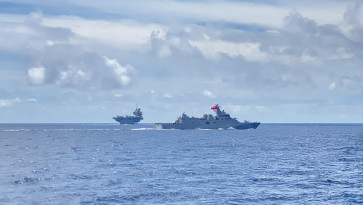Popular Reads
Top Results
Can't find what you're looking for?
View all search resultsPopular Reads
Top Results
Can't find what you're looking for?
View all search resultsNew terror bill may ‘contradict other prevailing laws’
The House of Representatives has appointed a former National Police deputy chief to chair the deliberation of another bill on terrorism amid concerns from some groups, including a senior military intelligence officer, that the new bill might overlap and even contradict prevailing laws on the gross crime
Change text size
Gift Premium Articles
to Anyone
T
he House of Representatives has appointed a former National Police deputy chief to chair the deliberation of another bill on terrorism amid concerns from some groups, including a senior military intelligence officer, that the new bill might overlap and even contradict prevailing laws on the gross crime.
Comr. Gen. (ret) Adang Daradjatun, who holds the position as the chairman of the House’s special committee overseeing the draft, insisted that the Bill on Prevention and Eradication of Terrorism Finance would be instrumental in boosting the government’s power in combating terrorism because it would provide clearer and more substantial legal certainties.
“We have seen an increase in the number of terrorist attacks in the country. The terrorists were able to carry out their operations because certain individuals or groups had supported them financially. We believe that cutting the flow of this financial assistance will help us put an end to terrorism,” the legislator from the Prosperous Justice Party (PKS) said on Sunday.
Adang added the Indonesian government should issue a separate law to monitor the fund-raising aspects of terrorism because the current Law No. 15/2003 on terrorism did not address this issue in detail.
Law and Human Rights Minister Amir Syamsudin, who acknowledged that he had not yet analyzed the draft thoroughly, stressed that drafting a new law was important because the current laws on terrorism and money laundering were not enough to tackle terrorism in Indonesia.
“The success of terrorists also depends on their financial aspects. This is what the draft targets. Moreover, we already ratified the UN convention and therefore must take an additional act,” he told The Jakarta Post.
However, University of Indonesia (UI) law expert Hikmahanto Juwana said the new anti-terrorism financing bill would overlap or even contradict existing laws that touched on terrorism, such as Law No. 25/2003 on money laundering and Law No. 8/2010 on the prevention of money laundering.
Meanwhile, Eva Kusuma Sundari, an Indonesian Democratic Party of Struggle (PDI-P) politician who also sits on the special committee, criticized the draft, saying that the government’s move was mainly triggered by the critical report of the Financial Action Task Force (FATF) on Indonesia in February and June this year.
FATF, a Paris-based international money-laundering watchdog, announced on its official website that Indonesia had not made sufficient progress in implementing its plan on anti-money laundering and combating the financing of terrorist activities, and certain strategic deficiencies remained.
Adang’s statement resonates with recent warnings issued by counterterrorism officials that terrorist groups have developed new ways to operate, including establishing alliances with drug syndicates and hacking foreign exchange websites to finance terrorist attacks.
The content of the anti-terrorism financing draft centers on illegal and suspicious financial activities carried out by any individuals or corporations, and emphasizes the role of the Financial Transactions Reports and Analysis Centre (PPATK).
Chapter 3, Article 4 of the draft says that any individual proven to have provided or collected funds willfully, directly or indirectly, with the intention that the funds should be used to carry out terrorist acts, will face a maximum penalty of 15 years imprisonment and a Rp 1 billion (US$107,000) fine.
Article 8 of the draft states that if the violation is committed by a company, it faces a maximum penalty of Rp 100 million and is at risk of losing its operational license and assets.
Law No. 15/2003 on terrorism, on the other hand, contains two articles that regulate terrorism financing and they carry a maximum penalty of 15 years’ imprisonment for anyone proven to have provided financial assistance for terrorist acts.
Adang said that the future anti-terrorism financing act was important because it would also function as the legal umbrella for the United Nations International Convention for the Suppression of the Financing of Terrorism, ratified by the Indonesian government in 2006.
But Hikmahanto disagreed. “This is a common misconception among lawmakers and government officials. What we have to do is examine the content of the current laws to find out whether or not they comply with the convention,” he said on Saturday.
Rr. Adm. Soleman B. Ponto, chief of the Indonesian Military’s Strategic Intelligence (BAIS), shared the concern of a possible overlapping in the bill. He added that, to him, it was not the funding that mattered, but the use of the funds.
“What if an alleged terrorist group transferred $1 million to my bank account and I used the money to play golf? It wouldn’t be wrong, would it?” he told the Post after a hearing at the House. (tas)










